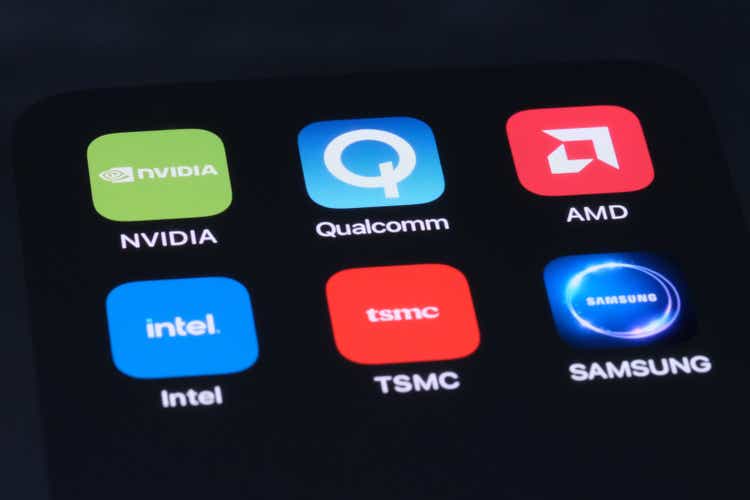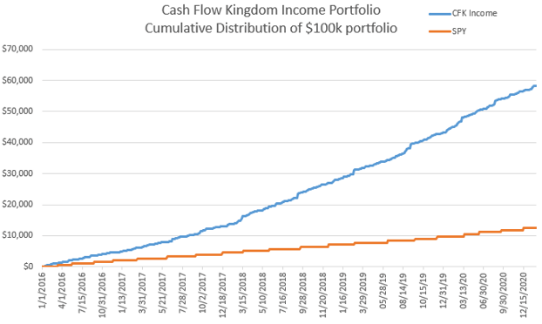Summary:
- Intel Corporation is struggling with high costs, a weak balance sheet, and declining market share, making it a potential acquisition target for more profitable chip companies.
- Qualcomm Incorporated, with strong free cash flows and better management, could be interested in acquiring Intel, but the deal poses significant risks and complexities.
- A stock-for-stock deal would result in substantial dilution and lower earnings per share for Qualcomm, making the acquisition unattractive for QCOM shareholders.
- Regulatory hurdles are high, and the FTC is likely to oppose such a large deal in the semiconductor space, further reducing the likelihood of a successful acquisition.
Robert Way
Article Thesis
Intel Corporation (NASDAQ:INTC) is in trouble, and other semiconductor companies may try to acquire the chip company. Qualcomm Incorporated (NASDAQ:QCOM) is one of the possible acquirers. In this article, we will take a look at what such a deal could look like and whether it could make sense for both parties.
Past Coverage
I have written about both Intel Corporation and Qualcomm Incorporated here on Seeking Alpha. My most recent Intel article is from early August, where I covered the company’s earnings results, while my most recent article about Qualcomm is from July. I have been more bullish on Qualcomm in the recent past, due to its better valuation, more attractive shareholder returns, fewer operational problems, and better growth performance. That remains the case today, as I am long QCOM while I have no position in INTC.
What Happened?
Intel Corporation has been in trouble for some time — high costs and massive capital expenditures hurt its cash flows and balance sheets, while its products aren’t attractive enough to maintain market share. Intel has been losing market share in the all-important data center market to Nvidia (NVDA) and Advanced Micro Devices (AMD), which, combined with high costs, has made Intel’s profits crash.
Intel Corporation’s balance sheet is getting weaker and weaker — long-term debt rose by more than $10 billion since the end of 2022 and now stands at $50 billion — which is why the company could be forced to make some strategic moves. The sale or spin-off of its foundry business is a possibility, but Intel could also sell itself to a bigger, more profitable chip company. A merger is a possibility as well.
Two of the biggest chip companies that could possibly make a move for Intel are Broadcom (AVGO) and Qualcomm. Broadcom has a history of major M&A deals, but is seemingly not overly interested in Intel. Qualcomm, on the other hand, has approached Intel about a takeover, according to reports. Let’s take a closer look.
Would A Takeover Make Sense?
Intel’s Perspective
For Intel, being acquired could indeed make a lot of sense, I believe. Today, Intel has a rather weak balance sheet that is getting weaker every year, while a negative free cash flow of $13 billion per year is not sustainable at all over the long run. Being acquired by a company with deeper pockets and a much stronger free cash flow profile would help with the planned capital expenditures for Intel’s foundry business. Qualcomm would offer this combination, with trailing twelve months free cash flows standing at $12.5 billion after accounting for QCOM’s own capital expenditures.
Moreover, Intel’s operations may also benefit from new leadership — QCOM is operating successfully and has not had huge mishaps in the recent past, unlike Intel, which may be a sign of stronger management at Qualcomm. Qualcomm’s executives might be able to do more with Intel’s assets.
If QCOM and INTC were to combine, there would likely also be some synergies. When it comes to product development, management, administration, and so on, headcount could likely be reduced, resulting in lower operating expenses and higher profits down the road, all else equal.
Of course, Intel’s shareholders would want to see a sizeable takeover premium, as most will likely not want to sell at a loss. And since Intel is trading at just one-third of the price it traded at a couple of years ago, I believe that many of Intel’s current shareholders are deep in the red.
Qualcomm’s Perspective
I do believe that being acquired at a sufficient takeover premium would make sense for both Intel as a business and Intel’s shareholders. However, I do not believe that such a move would necessarily make a lot of sense for Qualcomm and its shareholders. Today, QCOM’s shareholders own shares in a lower-risk business trading at an inexpensive valuation that is delivering attractive business growth and that offers sizeable shareholder returns. Acquiring Intel would increase complexity massively and would add substantial execution risks. Takeovers of this size can go wrong, after all. If QCOM acquires INTC, it would take on all of Intel’s problems. While Qualcomm generates very nice free cash flows now, the numbers would look a lot worse if Intel was acquired, as Qualcomm’s current free cash flows would then be needed to pay for Intel’s capital expenditures.
Qualcomm could benefit from Intel’s foundry business in the future if it were to acquire Intel, as this could help make Qualcomm more independent of Taiwan Semiconductor Manufacturing Company (TSM). In the case of an escalating Taiwan conflict, an in-house foundry business could be an asset. That being said, I do not believe that this is an overly important consideration, as the Taiwan conflict will hopefully not escalate — this would neither be in China’s nor Taiwan’s best interest, I believe.
When we think about a takeover, we should also think about how an acquisition of Intel by Qualcomm could be financed. Acquisitions can be done via stock-for-stock deals, or they can be done via a cash payment. A combination or mix of both is possible as well. In a stock-for-stock deal, debt would not be a problem, as no additional debt would be taken on beyond the combined debt that the two companies have today. A stock-for-stock deal would, however, cause substantial dilution, especially when we account for a takeover premium. Intel trades at a way higher valuation compared to Qualcomm, which means that earnings per share would be lower following a stock-for-stock deal. Let’s look at an example:
Qualcomm is forecasted to earn $10.04 per share this year, or $11.2 billion when accounting for a share count of 1.11 billion. Qualcomm’s share price is $169 today. Intel is forecasted to earn $0.26 per share this year, based on a share count of 4.26 billion, which pencils out to forecasted net profits of $1.1 billion. Intel’s share price is $22 today. If Qualcomm were to acquire all of Intel in a stock-for-stock deal with a 25% takeover premium, i.e., at $27.50 per share, it would have to issue one QCOM share for every 6.1 INTC shares. Qualcomm would thus have to issue 700 million new shares.
The post-deal net profit would be $12.3 billion, while the post-deal share count would be 1.81 billion, which pencils out to $6.80 in earnings per share. That’s way lower than the forecasted earnings per share of a little more than $10 for Qualcomm as a standalone company. Even if $3 billion in post-tax synergies could be captured — I don’t know whether that is realistic, it’s just to show what the impact would be — post-deal net profits would be $15.3 billion, and post-deal earnings per share would be $8.45. That would still be less than the earnings per share Qualcomm will earn as a standalone company. A stock-for-stock deal would thus not seem very attractive, I believe, due to Intel’s weak profitability and the fact that it trades at a much higher valuation compared to Qualcomm.
A cash-for-stock deal would require Qualcomm to pay out around $116 billion in cash, assuming a deal could be done at a 25% takeover premium. Qualcomm has $13 billion in cash on its balance sheet today, so it would have to take on more than $100 billion in new debt. I doubt that this is doable even for a company like Qualcomm, and even if it were doable, the interest costs would be substantially higher than Intel’s current net profits. If Qualcomm’s cost of debt for this new debt was 6%, then the additional interest expenses of a little more than $6 billion would be way higher than Intel’s current profits of around $1 billion a year. Due to the damage a cash-for-stock deal would do to QCOM’s balance sheet, I believe such a deal is highly unlikely.
A stock-for-stock deal would be possible, but would hurt earnings per share substantially, due to massive dilution. Overall, I believe this underlines that an acquisition of Intel by Qualcomm would not be especially attractive for QCOM’s shareholders. Management might disagree, of course, if they see a specific strategic rationale or if they were to be interested in building a larger company (???empire building???).
Some analysts have weighed in and argued that such a deal is unlikely to be allowed by regulators. Thus, even if the two companies were to agree on a deal, it would be far from guaranteed that such a deal could pass. The FTC is fighting against several much smaller deals right now (Albertson (ACI) ??? Kroger (KR) and Tapestry (TPR) ??? Capri (CPRI)), so I believe they would be especially interested in fighting against a massive deal in the semiconductor space. Regulatory hurdles for a QCOM-INTC deal would thus be very elevated, I believe.
Takeaway
Intel has substantial operational problems and its balance sheet is getting weaker and weaker. This issue could be battled if Intel is acquired by a stronger, more profitable chip company with better cash flows. That being said, I do not believe that a deal is overly likely, including due to substantial regulatory hurdles. A deal also doesn’t seem especially attractive for QCOM’s shareholders — the deal would be dilutive, and QCOM would add Intel’s massive operational issues. As a Qualcomm shareholder, I would prefer if QCOM does not buy Intel for now.
Analyst???s Disclosure: I/we have a beneficial long position in the shares of QCOM either through stock ownership, options, or other derivatives. I wrote this article myself, and it expresses my own opinions. I am not receiving compensation for it (other than from Seeking Alpha). I have no business relationship with any company whose stock is mentioned in this article.
Seeking Alpha’s Disclosure: Past performance is no guarantee of future results. No recommendation or advice is being given as to whether any investment is suitable for a particular investor. Any views or opinions expressed above may not reflect those of Seeking Alpha as a whole. Seeking Alpha is not a licensed securities dealer, broker or US investment adviser or investment bank. Our analysts are third party authors that include both professional investors and individual investors who may not be licensed or certified by any institute or regulatory body.
Is This an Income Stream Which Induces Fear?
 The primary goal of the Cash Flow Kingdom Income Portfolio is to produce an overall yield in the 7% – 10% range. We accomplish this by combining several different income streams to form an attractive, steady portfolio payout. The portfolio’s price can fluctuate, but the income stream remains consistent. Start your free two-week trial today!
The primary goal of the Cash Flow Kingdom Income Portfolio is to produce an overall yield in the 7% – 10% range. We accomplish this by combining several different income streams to form an attractive, steady portfolio payout. The portfolio’s price can fluctuate, but the income stream remains consistent. Start your free two-week trial today!
